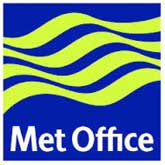
Adding to evidence for mankind's impact on the weather system, the probe found a link between these powerful storms and aerosols, the scientific term for specks of matter suspended in a gas.
Aerosols can occur in natural form, as dusty volcanic plumes, clouds or fog but are often man-made, such as sooty particles from burning coal or oil.
The study focused on particles from North America and Europe that were generated mainly from burning fossil fuels.
Researchers from the UK Met Office created weather simulations covering the period 1860 to 2050.
They found that tropical storms were much less frequent during periods when emissions of man-made aerosols increased over the North Atlantic.
"Increases in anthropogenic emissions (particularly of aerosols) through most of the last century are found to have reduced hurricane activity," co-author Ben Booth said.
"The cooling impact of man-made aerosol emissions may have had a more important regional impact on the climate than we previous appreciated," Booth said.
Aerosols reflect solar rays and change the brightness of clouds, which affects how much of the Sun's heat is projected onto the surface of the sea, the authors suggest.
Ocean warmth provides the raw energy for tropical storms, which in extreme conditions can brew into destructive hurricanes.
Conversely, the study found that measures since the 1980s to tackle pollution and improve air quality reduced levels of aerosols, and in turn ramped up hurricane activity.
"The clean-up of industrial aerosols in the last 20 years, while being beneficial for human health and linked to a recovery of African Sahel rains since the 1980s droughts, may have contributed to increases in Atlantic hurricane activity," Booth said by email.
The authors said their study, published in the journal Nature Geoscience, is the first to demonstrate a link between aerosols and Atlantic tropical storms.
The research team postulates that in the future, it will be Earth-warming greenhouse gases, much longer-lasting than aerosols, that will exert the most influence on tropical storm frequency.
Previous work published in Nature Climate Change had said that while the number of tropical storms was not projected to increase in future, their intensity was.
The hurricane season runs from June to November. For 2013, the US National Oceanic and Atmospheric Administration has predicted that between 13 and 20 "named" storms will occur, seven of them will hurricanes and between three and six of these will form into major hurricanes.
Source: AFP via I-Net Bridge

For more than two decades, I-Net Bridge has been one of South Africa’s preferred electronic providers of innovative solutions, data of the highest calibre, reliable platforms and excellent supporting systems. Our products include workstations, web applications and data feeds packaged with in-depth news and powerful analytical tools empowering clients to make meaningful decisions.
We pride ourselves on our wide variety of in-house skills, encompassing multiple platforms and applications. These skills enable us to not only function as a first class facility, but also design, implement and support all our client needs at a level that confirms I-Net Bridge a leader in its field.
Go to: http://www.inet.co.za